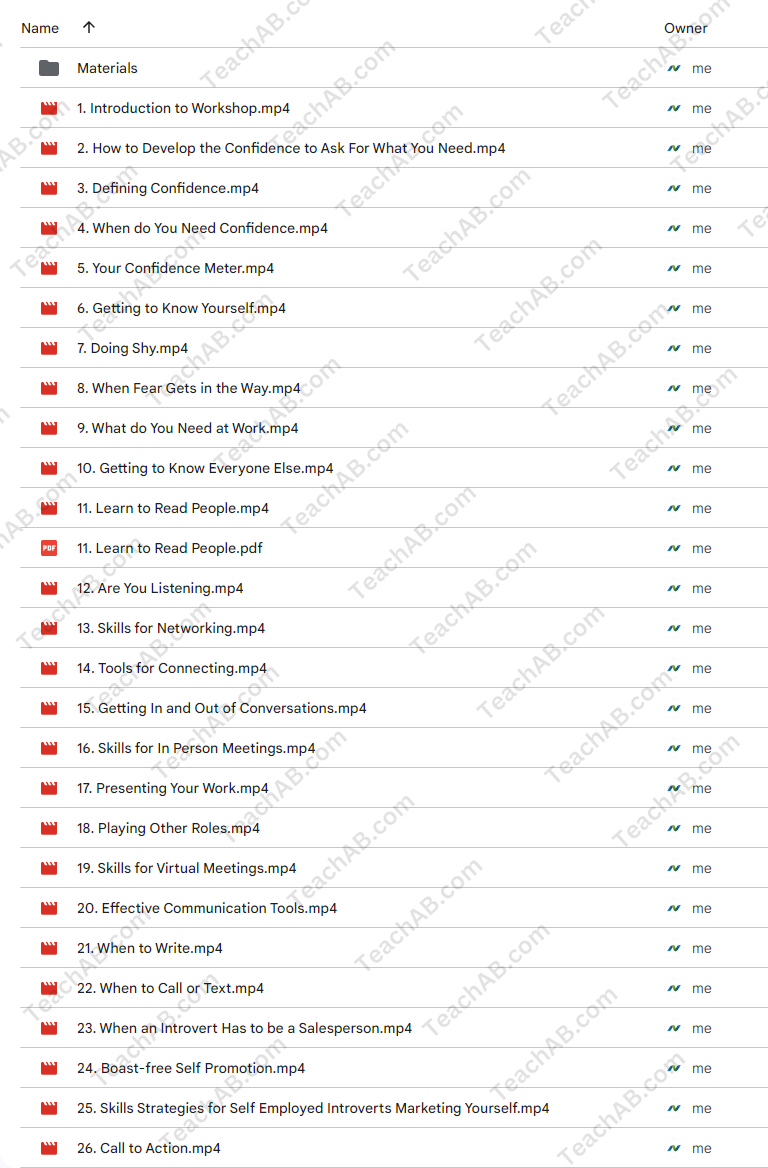Don’t Get Pushed Around: An Introvert’s Guide to Getting What You Need at Work By Ilise Benun
$14.00 Original price was: $14.00.$5.00Current price is: $5.00.
Don’t Get Pushed Around: An Introvert’s Guide to Getting What You Need at Work
Content Proof:
In a world that often celebrates extroverted individuals, introverts frequently find themselves navigating a seemingly hostile landscape. Don’t Get Pushed Around: An Introvert’s Guide to Getting What You Need at Work by Ilise Benun emerges as a beacon for those who identify with the quieter, more introspective side of the professional spectrum.
This guide is not just about thriving in a challenging work environment; it’s about recognizing and leveraging the unique strengths that introverts possess. The book is equated to a toolbox filled with practical strategies, empowering introverts to stand tall amidst the noise of their more boisterous colleagues. Benun challenges the status quo, asserting the idea that introverts shouldn’t feel pressured to morph into extroverts for success. Instead, they can harness their innate qualities for achievement and visibility in the workplace.
Understanding Introversion in the Workplace
Benun begins by dismantling the stereotypes often associated with introversion. Traditional corporate culture often misinterprets introverts as shy or antisocial, presenting a narrow view of their capabilities. However, introverts may simply require more personal space and reflection time, allowing for deeper thought processes. Through a series of analogies and metaphors, Benun draws attention to the unique roles introverts can play in collaborative environments likening them to the strong, silent oak tree that provides shelter amidst a bustling forest of activity. This natural tendency to listen and observe is not a weakness but rather a profound strength that can lead to exceptional insights and thoughtful contributions.
The book encourages introverts to embrace who they are, shedding the pressures to conform to extroverted norms. Benun’s views resonate with a growing body of research that highlights the importance of diverse personality types within teams. A study published in the Journal of Personality and Social Psychology reveals that teams composed of both introverted and extroverted members often perform better, as they balance energetic brainstorming with careful analysis. This compelling evidence suggests that the corporate environment thrives best when a variety of voices are present allowing introverts to bask in the value they add to a team.
Building Confidence and Communication Skills
One of the book’s standout features is its actionable advice on developing confidence. Benun provides readers with an array of exercises that target communication skills, a crucial area for many introverts who may struggle with initiating conversations and voicing their ideas. Techniques such as power posing or practicing speeches in front of a mirror serve as simple yet effective ways to bolster confidence.
Additionally, she emphasizes the importance of preparation an attribute that often aligns with introverted personality traits. For instance, creating detailed outlines before meetings or rehearsing presentations can empower introverts to present their ideas more articulately. This proactive approach echoes an essential concept in behavioral psychology: that preparation reduces anxiety. By approaching work situations deliberately, introverts can transform their fear into opportunity, becoming adept communicators without losing their authentic selves.
Essential Exercises for Introverted Professionals:
- Power Posing: Stand in a posture of confidence for a few minutes; this can lead to increased feelings of power.
- Mirror Practice: Rehearse your pitch or presentation in front of a mirror to enhance self-awareness.
- Mind Mapping: Generate an outline of your ideas visually, allowing for clearer structuring of thoughts.
By integrating these exercises into one’s routine, introverts can significantly enhance their comfort levels when engaging with colleagues or presenting ideas to management.
Networking with Authenticity
The prospect of networking can often evoke dread in introverts, who may find the idea of mingling in large groups daunting. Benun deftly tackles this challenge by encouraging readers to reframe their understanding of networking. Instead of viewing it as a transactional process, she presents it as an opportunity to forge genuine connections. By identifying personal networking styles and preferences, introverts can discover paths that honor their comfort zones while still enabling them to make meaningful professional connections.
For instance, Benun posits that rather than traversing crowded conferences, introverts might excel in smaller, more intimate settings, where conversations can delve deeper than surface-level small talk. She provides illustrations and examples of introverts who have successfully navigated networking events by adopting an approach that aligns with their personality, thereby fostering meaningful engagement. The idea is not to avoid networking altogether; rather, it is about crafting an authentic networking strategy that feels natural and sustainable.
Tips for Authentic Networking:
- Seek Smaller Events: Focus on smaller gatherings where deeper conversations can take place.
- Prepare Engaging Questions: Have a set of open-ended questions ready to facilitate conversation and show genuine interest.
- Follow Up: After meeting someone, send a personalized message that references your conversation to solidify the connection.
This reframing of networking from a utilitarian endeavor into a space for authenticity shifts the paradigm. Benun makes it clear that introverts are not only capable of building a robust professional network but can thrive in doing so, transforming their workplace experience into one characterized by true connection rather than obligation.
Leveraging Intrinsic Strengths
Benun emphasizes that introverts need not mimic extroverted behavior to gain visibility and success. The book celebrates qualities such as reflective thinking, listening skills, and a preference for meaningful communication traits that uniquely position introverts to excel in roles requiring depth over breadth. Moreover, by capitalizing on these intrinsic strengths, introverts can find fulfillment and recognition in their work without compromising their nature.
Research supports that introverted leaders who tend to engage in thoughtful decision-making often produce innovative solutions that benefit their teams. An article from Harvard Business Review highlights that introverted managers bring out the best in their teams by fostering an environment where team members feel valued and heard. This approach ultimately leads to enhanced morale and productivity, proving that introverted leaders can succeed remarkably in managing and motivating diverse teams.
Core Strengths of Introverts:
- Active Listening: Introverts are often exceptional listeners, bringing clarity and focus to discussions.
- Thoughtful Analysis: Their ability to ponder before responding leads to strategic decision-making.
- Genuine Relationships: An introverted approach fosters deeper, more meaningful workplace relationships, enhancing team dynamics.
By encouraging readers to appreciate and embrace these qualities, Benun lays the foundation for nurturing self-acceptance and confidence in their professional journeys.
Conclusion
In Don’t Get Pushed Around, Ilise Benun skillfully crafts a resourceful guide for introverts, providing them with the tools necessary to navigate the noise-filled workplaces of today. The book illustrates that introverts can not only endure but flourish by understanding their uniqueness and leveraging their inherent strengths. By reshaping their perceptions around communication, networking, and visibility, introverts can reclaim their power within the corporate world.
Ultimately, the guidance offered does not merely aid in surviving work challenges; it promotes a paradigm shift that celebrates the introverted voice, emphasizing that quiet strength and thoughtful engagement are truly formidable assets in any professional setting. In a competitive landscape, being introverted isn’t a hurdle; it’s an advantage waiting to be realized. Thus, every introverted professional can take comfort in the notion that they truly don’t have to get pushed around.
Frequently Asked Questions:
Business Model Innovation: We use a group buying strategy that enables participants to share costs and access popular courses at lower prices. This approach helps individuals with limited financial resources, although it may raise concerns among content creators regarding distribution methods.
Legal Considerations: Our operations navigate complex legal issues. While we do not have explicit permission from course creators to resell their content, there are no specific resale restrictions mentioned at the time of purchase. This lack of clarity allows us to offer affordable educational resources.
Quality Control: We guarantee that all course materials provided are identical to those offered directly by the creators. However, please note that we are not official providers. As a result, our services do not include:
– Live coaching calls or sessions with the course author
– Access to exclusive author-controlled groups or portals
– Membership in private forums
– Direct email support from the author or their team
Our goal is to make education more accessible by offering these courses independently, without the additional premium services available through official channels. We appreciate your understanding of our unique approach.
Be the first to review “Don’t Get Pushed Around: An Introvert’s Guide to Getting What You Need at Work By Ilise Benun” Cancel reply
You must be logged in to post a review.
Related products
Business
Personal Development
Activate Your Money Magnetism – Become Your Richest Self in 8 Weeks – Rachael Hunt
Personal Development
Personal Development
Personal Development
Personal Development
Unreal Series: Multiverse Key – Talmadge Harper – Harper Healing
Multimedia
Personal Development
VIBE – Secrets of Masculine & Charismatic Body Language – Chris Archer
Personal Development
Personal Development
Personal Development
Personal Development
Hypnosis & NLP
Personal Development



















Reviews
There are no reviews yet.